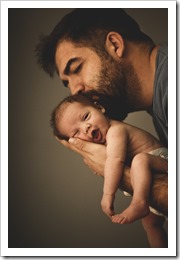 Both men’s and women’s ages at time of conception are increasing. The average age of fathers of newborns in the U.S. has risen by 3.5 years over the last forty years from an average age of 27.4 to 30.9 years. There are also some ethnic differences, with Asian-American dads, there is an average of 36 years and older. African-American fathers were found to be the youngest. Education matters as well with those fathers who have a college degree typically around 33.3 years old. Men in their 40s, make up about 9 percent of all new U.S. births and men over the age of 50, around 1 percent of all fathers of newborns.
Both men’s and women’s ages at time of conception are increasing. The average age of fathers of newborns in the U.S. has risen by 3.5 years over the last forty years from an average age of 27.4 to 30.9 years. There are also some ethnic differences, with Asian-American dads, there is an average of 36 years and older. African-American fathers were found to be the youngest. Education matters as well with those fathers who have a college degree typically around 33.3 years old. Men in their 40s, make up about 9 percent of all new U.S. births and men over the age of 50, around 1 percent of all fathers of newborns.
In the latest study, after controlling for maternal age, race, education, smoking status, and number of prenatal visits, men who are older than 35 had higher odds of fathering infants born prematurely and lower in birth weight compared to men who are 25 to 35 years old. For infants who are fathered by men older than 55, the infants are more likely to have required assisted ventilation and are more likely to be admitted to the neonatal intensive care unit.
Commentary: Planning pregnancies and child rearing is complex and under optimal circumstances, requires consideration of a range of issues that are very personal, but include social, financial, psychological and biological factors. The current study is an important reminder that we must not only consider the woman, but the man, and ideally, preconception conversations and clinical appointments include considering the paternal age, as well as the maternal age.
References:
Khandwala Y, et al. Aassociation of paternal age with perinatal outcomes between 2007 and 2016 in the U.S.: Population based cohort study. BMJ 2018; Oct 31, 363.
Brown H. Paternal factors in preconception care: The case of paternal age. Standard approach to preconception care should include both sexes. BMJ 2018 Oct 31: k4466
Healthy Babies and Dad’s Biological Clock
Dec 17th, 2018 by Tori Hudson, N.D.

